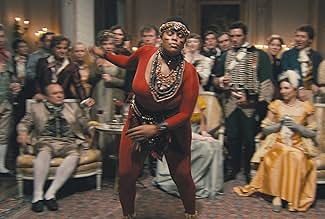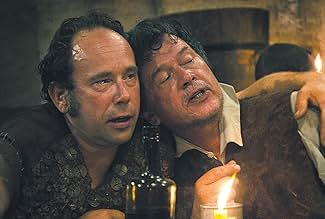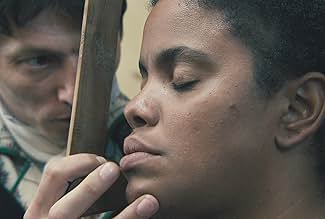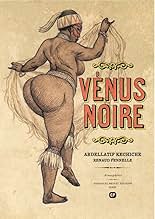AVALIAÇÃO DA IMDb
6,8/10
3,1 mil
SUA AVALIAÇÃO
No século XIX, uma mulher negra da África é exibida em toda a Europa como uma curiosidade exótica.No século XIX, uma mulher negra da África é exibida em toda a Europa como uma curiosidade exótica.No século XIX, uma mulher negra da África é exibida em toda a Europa como uma curiosidade exótica.
- Direção
- Roteiristas
- Artistas
- Prêmios
- 2 vitórias e 5 indicações no total
Avaliações em destaque
excerpt, full review at my location - While some will attest that the armless Venus De Milo is a work of art, actual physical faults are treated with considerably less vigour – even when they're a result of nature itself. The Venus in Abdellatif Kechiche's biographical drama never comes close to attaining the stature of a God, but nevertheless provides the basis for a fascinating meditation on how one can be judged by the sum of their apparent parts.
The film's value lies in its ability to interconnect human sciences with medical science, genuinely accessible as an historical biopic of sorts, but never exclusively tied to a timeline. In avoiding becoming too self- righteous towards his subject, Kechiche achieves a lot with his ambitiously-scoped examination of cultural ignorance, and integrates conventional biopic stamps into his outlandish topic. Even if a chunk of Black Venus could acceptably be consigned to the cutting room floor, it's difficult to condemn its unrelenting vision, and the level of interest in its unique appeal makes for a thoroughly worthwhile experience.
The film's value lies in its ability to interconnect human sciences with medical science, genuinely accessible as an historical biopic of sorts, but never exclusively tied to a timeline. In avoiding becoming too self- righteous towards his subject, Kechiche achieves a lot with his ambitiously-scoped examination of cultural ignorance, and integrates conventional biopic stamps into his outlandish topic. Even if a chunk of Black Venus could acceptably be consigned to the cutting room floor, it's difficult to condemn its unrelenting vision, and the level of interest in its unique appeal makes for a thoroughly worthwhile experience.
This is the story of the black woman in the early 1800s, shown on cheap varieties as the so called Hottentott Venus. She behaves like an animal, is treated on stage as an animal and is regarded as such by the rude audiences.
She isn't a slave. Not technically, but the agreement with her employer is of course on his terms. There are also other forms of performances. This woman also acts in front of Parisian high society and not at least in front of the scientists of the time, who find resemblances with the orangutan.
What her employers is exploiting is not just this woman; they also exploit racism and the different kind of audiences let their racism be exploited. There are of course money to be made from prejudices. 200 years ago and now. This our lesson.
She isn't a slave. Not technically, but the agreement with her employer is of course on his terms. There are also other forms of performances. This woman also acts in front of Parisian high society and not at least in front of the scientists of the time, who find resemblances with the orangutan.
What her employers is exploiting is not just this woman; they also exploit racism and the different kind of audiences let their racism be exploited. There are of course money to be made from prejudices. 200 years ago and now. This our lesson.
it is not only the pain of lead character but , in a special form, the pain of viewer. because not only racism and exploitation of a woman vulnerability are the subjects but large manner to discover, in each period, in each society, the other, the stranger, the strange, the exotic victim who inspire fake feeling of power. it is the film of an admirable actress and a necessary lesson about sins who are not absolved. it is a kind of mirror. more than touching, it is terrible. more than terrible it is honest image of a circle. and , maybe, image of a sacrifice who has as axis the force of silence. a powerful message. reflection of profound pain. that is all. and the image of a human been as ordinary tool.
Was this film 3 hours long or fourteen? Kechiche takes us across borders (Africa / Europe, Dead / Living, Savage / Civilized) in a movie that has the gravitas and sensual weight of a kind of stations of the cross. The "Venus" is our Christ, suffering for and as the direct result of our sins, chief among those the blindness we call racism. Potently, even explosively mixed with virulent sexism, racism shapes the ever more horrible experience of the film's subject, as she is reduced (figuratively and then literally) to an object. The film is gorgeous, infinitely wise about the costs of being marked (trapped in the legibly different body), smart about the role that money plays in the ongoing betrayal (if Judas saw this film he'd really feel rooked: the point is not to sell out Christ, the point is how many times you can--for an increasing price--take trust to market), and worth every minute of horrified attention. Then--you ask-- why an "8"? Of course we are (as the film is eager to point out), as spectators, aligned with all those who want to look at this...complicated site of excitements--but we are also (in tight close-up for the tears that always start in Yahima Torres' left eye) vaguely miserable with her (growling at the end of a chain is okay, being touched is--at first--not) and then...nowhere. Who was she? What did she (aside from bright red leather gloves and a tres joli hat) want? There's something about this film, in other words, that seems just about as hard and cold and stiff as the plaster cast of the Hottentot, which seems always just on the verge of coming to life.
It is impossible to rate this film because it is about the subject inexplicably painful and graphic, and still absolutely worth seeing, no matter how difficult it is. It is about sexualized racism. And it says a lot about white man and a white Europe. We still live in that world. This film make people think. I cannot recommend it to anyone sensitive, still I have to praise the director and the lead actress. Knowing that Abdelativ Kechiche made also two other great movies, Kus-kus and Blue is the warmest color, I understand his poetics, and this film falls in that category of his great films as well.
Of course, from the first minute of the movie, we know how a black African woman will be treated in white Europe 100 years ago, just probably, especially if we are from white Europe, we did not have a clue about the extent and details of how racist gender abuse looks like, and what is the link to the presence. Now we know, and we cannot pretend that we haven't seen this film.
Of course, from the first minute of the movie, we know how a black African woman will be treated in white Europe 100 years ago, just probably, especially if we are from white Europe, we did not have a clue about the extent and details of how racist gender abuse looks like, and what is the link to the presence. Now we know, and we cannot pretend that we haven't seen this film.
Você sabia?
- CuriosidadesYahima Torres was discovered walking down the street in Belleville.
- ConexõesFeatured in El lado oscuro: Abdellatif Kechiche (2024)
Principais escolhas
Faça login para avaliar e ver a lista de recomendações personalizadas
- How long is Black Venus?Fornecido pela Alexa
Detalhes
- Data de lançamento
- Países de origem
- Central de atendimento oficial
- Idiomas
- Também conhecido como
- Black Venus
- Locações de filme
- Empresas de produção
- Consulte mais créditos da empresa na IMDbPro
Bilheteria
- Faturamento bruto mundial
- US$ 1.514.245
Contribua para esta página
Sugerir uma alteração ou adicionar conteúdo ausente

![Assistir a Bande-annonce [OV]](https://m.media-amazon.com/images/M/MV5BZTM1MzZhZjUtNmU4MC00NjcxLWI1NDktYTRjNDY1NmVlMDBjXkEyXkFqcGdeQXRyYW5zY29kZS13b3JrZmxvdw@@._V1_QL75_UX500_CR0)


























